六年级英语下册第二单元知识点整理人教版
人教精通版六下英语第二单元知识点总结
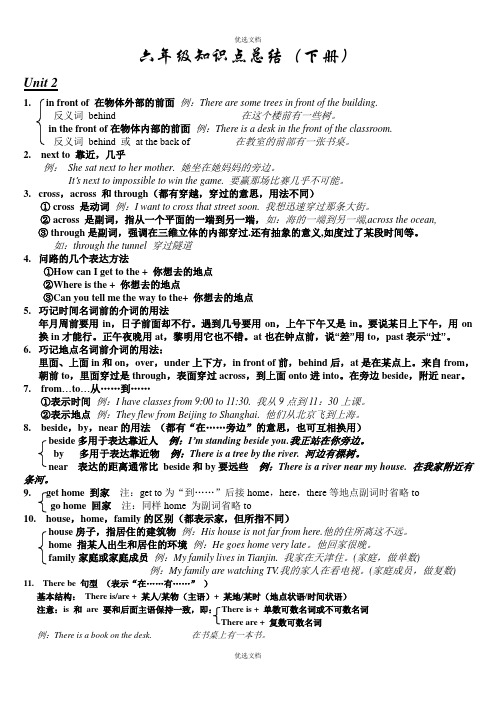
六年级知识点总结(下册)Unit 21. in front of 在物体外部的前面例:There are some trees in front of the building.反义词behind在这个楼前有一些树。
in the front of在物体内部的前面例:There is a desk in the front of the classroom.反义词behind 或at the back of在教室的前部有一张书桌。
2.next to 靠近,几乎例:She sat next to her mother. 她坐在她妈妈的旁边。
It’s next to impossible to win the game. 要赢那场比赛几乎不可能。
3.cross,across 和through(都有穿越,穿过的意思,用法不同)① cross 是动词例:I want to cross that street soon. 我想迅速穿过那条大街。
② across 是副词,指从一个平面的一端到另一端,如:海的一端到另一端,across the ocean,③ through是副词,强调在三维立体的内部穿过.还有抽象的意义,如度过了某段时间等。
如:through the tunnel 穿过隧道4.问路的几个表达方法①How can I get to the + 你想去的地点②Where is the + 你想去的地点③Can you tell me the way to the+ 你想去的地点5.巧记时间名词前的介词的用法年月周前要用in,日子前面却不行。
遇到几号要用on,上午下午又是in。
要说某日上下午,用on 换in才能行。
正午夜晚用at,黎明用它也不错。
at也在钟点前,说“差”用to,past表示“过”。
6.巧记地点名词前介词的用法:里面、上面in和on,over,under上下方,in front of前,behind后,at是在某点上。
(完整版)人教版六年级英语下册Unit2知识点汇总
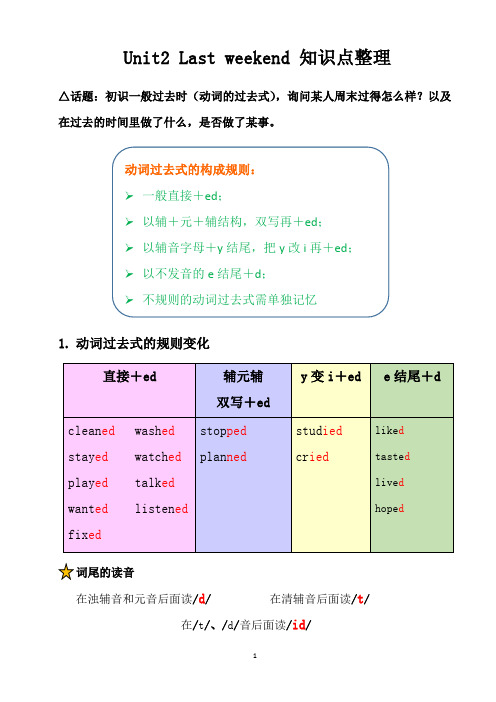
Unit2 Last weekend 知识点整理△话题:初识一般过去时(动词的过去式),询问某人周末过得怎么样?以及在过去的时间里做了什么,是否做了某事。
1.动词过去式的规则变化词尾的读音在浊辅音和元音后面读/d/ 在清辅音后面读/t/在/t/、/d/音后面读/id/2.不规则动词过去式do/does did am/is was are were have/has had see saw drink drank go went sleep slept make made get got read read3.动词短语cleaned my room washed my clothes stayed at home watched TV did my homework drank tea(喝茶) read a book saw a film(看电影) had a cold(感冒) went boating(划船) listened to music made the bed(整理床铺) 4.时间短语last night(昨晚)last Monday(上周一) last weekend(上个周末) yesterday(昨天) the day before yesterday(前天)△句型:①询问对方周末过得怎么样How was your weekend?—— It was fine/good/great,thank you.②询问某人在过去的时间里做了什么What did+主语+do(+过去时间)?——主语+动词过去式+其他。
例句:What did you do last weekend?—— I stay ed at home and watch ed TV.③询问对方在过去的时间里是否做了某事Did +主语+动词原形+其他?—— Yes,主语 did. / No, 主语 didn’t.例句:Did he have a cold yesterday?—— Yes,he did. / No,he didn’t.Did you see a film (last night)?—— Yes,I did. / No,I didn’t.④询问电影是否有趣Was it interesting?—— Yes,it was. / No, it wasn’t.△知识点:1:否定(缩写)形式:直接+not did didn’twas wasn’t were weren’t2:想要做某事:want + to +动词原形3:than+动词ing 例:It’s faster than walking.4:enjoy(享受)+动词ing I enjoy playing computer games. 5: too 用于肯定句either 用于否定句6: 句型的转换①He read a book yesterday afternoon.(对划线部分提问)What did he do yesterday afternoon ?②I washed my clothes last morning.(改为一般疑问句)Did you wash your clothes last morning?也③I went shopping last night. (改为否定句)I didn’t go shopping last weekend.④Did you do your homework last night. (否定回答)No,I didn’t.⑤My weekend was bad . (就划线部分提问)How was your weekend ?易错题❖ She usually clean s her room on the weekend.❖ She clean ed her room last weekend.❖ I like watch ing TV. I watch ed TV yesterday.❖ I am going to see a film next Friday. I saw a film last Friday. ❖ We didn’t go boating the day before yesterday.。
人教版六年级下unit 2知识点总结

Unit 2 Last weekend.知识点总结一必背单词cleaned( clean的过去式)打扫stayed(stay的过去式)停留washed(wash的过去式)洗watched( watch的过去式)看had(have的过去式)患病;得病slept(sleep的过去式)睡觉read(read的过去式)读saw(see的过去式)看见last最近的;上一个的yesterday昨天before在…之前had a cold感冒二必背词组动词短语talked about谈论(过去式) stayed at home待在家里(过去式) drank tea 喝茶(过去式)watched TV看电视(过去式) watched some children`s shows看一些儿童节目(过去式)did something else做其他事情(过去式)cleaned my room打扫房间(过去式) washed clothes洗衣服(过去式) read a new film magazine 看一部新的电影杂质(过去式)buy the new film magazine 买新一期的电影杂质had a cold 感冒(过去式)cooked the food 烹饪食物(过去式) read a book 读书(过去式)did my homework做家庭作业(过去式went fishing去钓鱼(过去式) played football 踢足球(过去式) saw a film看电影(过去式)时间短语last weekend上周末Last night昨晚all weekend整个周末all night整晚the day before yesterday 前天on Saturday morning / afternoon 在星期六上午/下午三重点句型1.How was….用来询间对方过去的某个时过得如何句式结构:How+was+时间名词(短语)?回答:主语+was+形容词。
六年级下册英语二单元知识点归纳
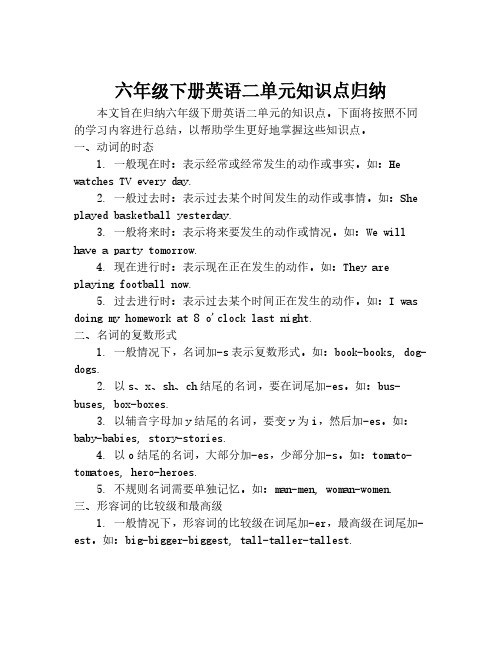
六年级下册英语二单元知识点归纳 本文旨在归纳六年级下册英语二单元的知识点。
下面将按照不同的学习内容进行总结,以帮助学生更好地掌握这些知识点。
一、动词的时态 1. 一般现在时:表示经常或经常发生的动作或事实。
如:He watches TV every day. 2. 一般过去时:表示过去某个时间发生的动作或事情。
如:She played basketball yesterday. 3. 一般将来时:表示将来要发生的动作或情况。
如:We will have a party tomorrow. 4. 现在进行时:表示现在正在发生的动作。
如:They are playing football now. 5. 过去进行时:表示过去某个时间正在发生的动作。
如:I was doing my homework at 8 o'clock last night.二、名词的复数形式 1. 一般情况下,名词加-s表示复数形式。
如:book-books, dog-dogs. 2. 以s、x、sh、ch结尾的名词,要在词尾加-es。
如:bus-buses, box-boxes. 3. 以辅音字母加y结尾的名词,要变y为i,然后加-es。
如:baby-babies, story-stories. 4. 以o结尾的名词,大部分加-es,少部分加-s。
如:tomato-tomatoes, hero-heroes. 5. 不规则名词需要单独记忆。
如:man-men, woman-women.三、形容词的比较级和最高级 1. 一般情况下,形容词的比较级在词尾加-er,最高级在词尾加-est。
如:big-bigger-biggest, tall-taller-tallest. 2. 以一个辅音字母加一个元音字母结尾的单音节词,要双写最后一个辅音字母,再加-er或-est。
如:hot-hotter-hottest, big-bigger-biggest. 3. 以y结尾的形容词,要变y为i,再加-er或-est。
六年级下英语知识点归纳Unit2What’sthematterMike_人教PEP
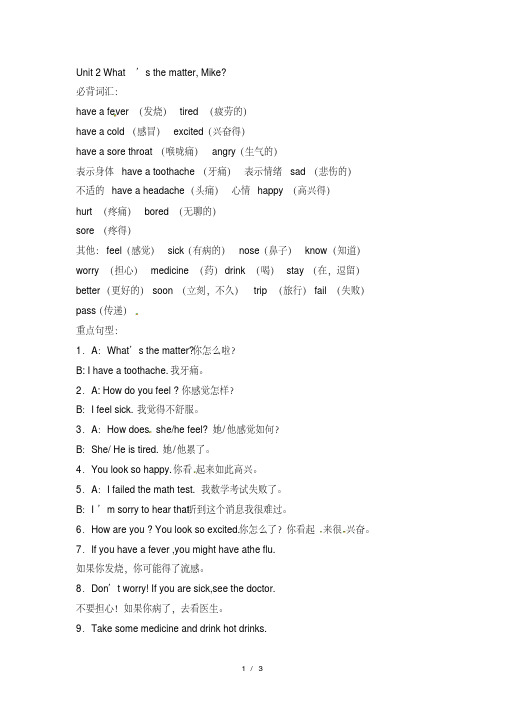
Unit 2 What’s the matter, Mike?必背词汇:have a fever (发烧)tired (疲劳的)have a cold (感冒)excited(兴奋得)have a sore throat (喉咙痛)angry(生气的)表示身体have a toothache (牙痛)表示情绪sad (悲伤的)不适的have a headache (头痛)心情happy (高兴得)hurt (疼痛)bored (无聊的)sore (疼得)其他:feel(感觉)sick(有病的)nose(鼻子)know(知道)worry (担心)medicine (药)drink (喝)stay (在,逗留)better(更好的)soon (立刻,不久)trip (旅行)fail (失败)pass(传递)重点句型:1.A:What’s the matter? 你怎么啦?B: I have a toothache. 我牙痛。
2.A: How do you feel ? 你感觉怎样?B:I feel sick. 我觉得不舒服。
3.A:How does she/he feel? 她/他感觉如何?B:She/ He is tired. 她/他累了。
4.You look so happy. 你看起来如此高兴。
5.A:I failed the math test. 我数学考试失败了。
B:I’m sorry to hear that. 听到这个消息我很难过。
6.How are you ? You look so excited. 你怎么了?你看起来很兴奋。
7.If you have a fever ,you might have athe flu.如果你发烧,你可能得了流感。
8.Don’t worry! If you are sick,see the doctor.不要担心!如果你病了,去看医生。
9.Take some medicine and drink hot drinks.吃些药和热饮料。
人教英语六下第二单元的知识
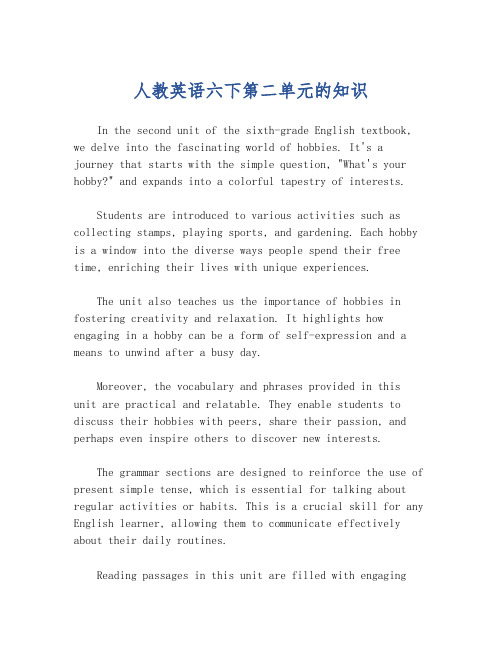
人教英语六下第二单元的知识In the second unit of the sixth-grade English textbook, we delve into the fascinating world of hobbies. It's a journey that starts with the simple question, "What's your hobby?" and expands into a colorful tapestry of interests.Students are introduced to various activities such as collecting stamps, playing sports, and gardening. Each hobby is a window into the diverse ways people spend their free time, enriching their lives with unique experiences.The unit also teaches us the importance of hobbies in fostering creativity and relaxation. It highlights how engaging in a hobby can be a form of self-expression and a means to unwind after a busy day.Moreover, the vocabulary and phrases provided in thisunit are practical and relatable. They enable students to discuss their hobbies with peers, share their passion, and perhaps even inspire others to discover new interests.The grammar sections are designed to reinforce the use of present simple tense, which is essential for talking about regular activities or habits. This is a crucial skill for any English learner, allowing them to communicate effectively about their daily routines.Reading passages in this unit are filled with engagingstories about people and their hobbies. They not only provide a context for language learning but also encourage students to think about their own hobbies and how they can be part of a balanced lifestyle.In addition, the unit includes interactive exercises and role-plays that allow students to practice their speaking skills. These activities are designed to be both fun and educational, ensuring that students remain motivated and engaged throughout the learning process.Finally, the unit concludes with a project where students are encouraged to research and present on a hobby of their choice. This not only consolidates their learning but also gives them a platform to showcase their creativity and public speaking skills.。
人教版小学英语六年级下册第二单元知识点归纳

Unit 2 whsa t he matter Pronun ciati 发音/ ei / pa 痛苦 bab 婴儿tai 尾巴da^白天 / ai /pir 松树 bike d 行车 typ 打字 dive 潜水 / /poin 指出 boy 男孩 toy 玩具 doye 老前辈练习找出与画线部分发音相同的单词 1、( ) Pa in A today B Mon day C banana 2( ) bike A big B dive C little 3 ( ) type A baby BcryC family 4 () boy AsayB noseC soilWordshave a sore tlhfo# 痛cold 感冒headac C e 痛 toothac 牙痛痛broke n leg:伤的腿 痛have a fe 发烧have a toothaCh 痛hurt 受伤 have a headaCh痛have a co 感冒 feve 发烧sore thro 喉咙earach 耳朵痛sore no鼻子痛lets readSome people feel sick in the winter.Many people get许多人患流感. Ma ny可数名词; -Much+不可数名词How do you know whe n you have the flu?Do you have a sore 你喉a咙痛吗 a sore thro喉咙痛Does your nose你鼻子痛吗Do you have a hea你头痛吗If you have a f如果!你发烧,you might have t你可能得了流感.Don't wo不要担心!If you are s如果你感觉不舒服,be sicl不舒服see the docto看医生.Take some medici ne and drink hot drakesmedici 吃药Stay in bed for a few在床上呆几天Stay in bedStay at homef寺在家You will feel bette你很o快就会感觉好多了good-- bet好的比较级Part BLet's lear ntirec疲劳excite兴奋angr生气happ高兴sad伤心bore烦恼How does Amy feel? She's tired. (S + be + adj.Pair workHow does Lisa feel?How are you feeli ng?She's happy.No,sorry. She's sad.Let's try1、Tonhasa lot of homework. ① a lot of = lots 许多的He goto bed very late. * ② have---hasgo---go;sdo---does How cfeeTom feel? ③ go to be d 床睡觉2、Mary has to say "goodbye" to her friend.How dose Mary feel? * Say goodbye 与某人说!见3 Jack can't play with his frie nds this weeke nd.He has nothing to do. *①play with 玩② have nothing to doHow dose Jack feel?4、Larry loves ice cream.He is eatt ing a big chocolate ice cream.How dose Larry feel?Let's talkB: I failed the math test.III阿A: How are you,Liu Yun? You look so①appy a tr去旅游B: Yes .I am excited. I am going on a (Bg a i l r t p e te考试败A: How are you,SacahobYsad today.③ fail ------ pas通过④ I am sorry to hear that.A: rm sorry to hear that. Pair workA: Look at the picture. How do I feel?look a 看 ?要加看的对象 B: You look sad.① look look lik 看起来像A: Yes,because I failed my math testJ ook 看起来 A: Look at the picture.How do I feel?look 看起来sth.Let's readIt's Saturday morning. The weather is fine. There is a football match betwee n Class 1 and Class 3. Many stude nts are watch ing. They are excited. Now hahe ball. ptessetsto Mike. M k ieksthe ball. It's a goal! Now Zhartgafflenball. Hekst. The bflilesi nto Joh n's face! Joh n is a little angry bB u httefbals head. Itfliesnto the goal. Ano ther goal! How's joh n feeli ng now? Guess! He's so happy! Hooray! Class 1 won the game.lBut Class 3 is not sad. TheyB: You look happy.赛)② watc 观看(通常接,比A: Yes,because I got a new pictures 看① see sb.do sth.② see sb.doing通常指听到不好的事情are laugh ing at Joh n's funny goal!Lets①bounce baun siz] 弹、反射②betweerA and B 在A和B之间③fine good well的区别④pass t递⑤win ---wo( win的过去时⑥laugh at因而发笑;嘲笑;蔑视;对满不在乎Group workWe are going to have a football match. I'm very happy. My mother is going to buy me a new skirt. I'm very happy. My mom is going on a trip without me.I'm very sad.I failed my Chin ese test. I feel very sad.① buy sb.sth =buy sth给某sb买东: ②without没有,缺乏。
小学六年级英语下册的第二单元复习学习知识点学习整理人教版本
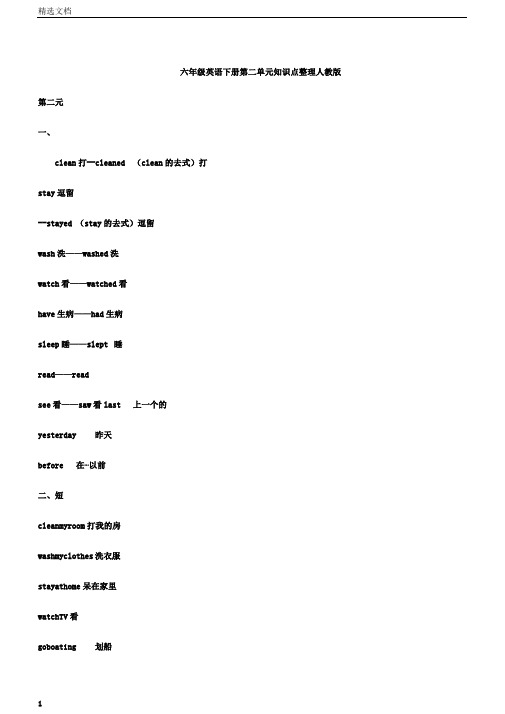
六年级英语下册第二单元知识点整理人教版第二元一、clean打--cleaned (clean的去式)打stay逗留--stayed (stay的去式)逗留wash洗——washed洗watch看——watched看have生病——had生病sleep睡——slept 睡read——readsee看——saw看last 上一个的yesterday 昨天before 在⋯以前二、短cleanmyroom打我的房washmyclothes 洗衣服stayathome呆在家里watchTV看goboating 划船readabook4.Istayedathomewithyourgrandma.seeafilm 看电影haveacold 感冒sleep睡觉(过去式slept)climbamountain 登山cookeddinner 做饭cooknoodles 面条三、句子.Howwasyourweekend?你周末过得怎么样?2.Itwasgood/fine/ok,thankyou. 很好,感谢!3.whatdidyoudolastweekend? 你上个周末干了什么?我和你奶奶呆在家里.(with和谁)5.Didyoudoanythingelse? 你还做了其余什么事吗?6.yes,Icleanedmyroomandwashedmyclothes. 是的,我扫了房间,还洗了衣服。
7.Iwanttobuythenewfilmmagazine. 我想买期新的电影杂志。
8.Didyouseeafilm? 你看电影了吗?No,Ididn ’t.Ihadacold.Istayedathomeallweekendandslept. 没有,我感冒了。
整个周末都呆在家里睡觉。
四、语法知识:一般过去时.一般过去时表示过去某个时间发生的动作或存在的状态,常和表示过去的时间状语连用。
一般过去时也表示过去常常或频频发生的动作感谢。
- 1、下载文档前请自行甄别文档内容的完整性,平台不提供额外的编辑、内容补充、找答案等附加服务。
- 2、"仅部分预览"的文档,不可在线预览部分如存在完整性等问题,可反馈申请退款(可完整预览的文档不适用该条件!)。
- 3、如文档侵犯您的权益,请联系客服反馈,我们会尽快为您处理(人工客服工作时间:9:00-18:30)。
六年级英语下册第二单元知识点整理人
教版
第二单元
一、单词clean 打扫--cleaned (clean 的过去式)打扫
stay 停留
--stayed (stay 的过去式)停留wash 洗——washed 洗watch 看——watched 看have 患病——had 患病sleep 睡觉——slept 睡觉read 读——read 读see 看见——
saw 看见last 上一个的yesterday 昨天before 在…之前
二、短语
cleanmyroom 打扫我的房间washmyclothes 洗衣服
stayathome 呆在家里watchTV 看电视goboating 划船
readabook 读书seeafilm 看电影haveacold 感冒sleep 睡觉(过去式slept )climbamountain 爬山cookeddinner
做饭cooknoodles 面条
三、句子
.Howwasyourweekend? 你周末过得怎么样?
2.Itwasgood/fine/ok,thankyou. 很好,谢谢!
3.whatdidyoudolastweekend? 你上个周末干了什么?
4.Istayedathomewithyourgrandma. 我和你奶奶呆在家里.
(with 和谁)
5.Didyoudoanythingelse? 你还做了其他什么事吗?
6.yes,Icleanedmyroomandwashedmyclothes. 是的,我扫了房间,还洗了衣服。
7.Iwanttobuythenewfilmmagazine. 我想买期新的电影杂志。
8.Didyouseeafilm? 你看电影了吗?
No,Ididn ' t.Ihadacold.Istayedathomeallweekendandslept. 感冒
没有,我了。
整个周末都呆在家里睡觉。
四、语法知识:
一般过去时
.一般过去时表示过去某个时间发生的动作或存在的状态,常和表示过去的时间状语连用。
一般过去时也表示过去经常或反复发生的动作感谢。
2.Be 动词在一般过去时中的变化:
⑴am 和is 在一般过去时中变为was。
wasnot=wasn t)
⑵are 在一般过去时中变为were。
(werenot=weren
t)
⑶带有was 或were 的句子,其否定、疑问的变化和is,am,are 一样,即否定句在was 或were 后加not ,一般疑问句把was 或were 调到句首。
3.句中没有be 动词的一般过去时的句子
否定句:didn ' t+ 动词原形,如:jimdidn ' tgohomeyesterday.
一般疑问句:在句首加did ,句子中的动词过去式变回原形。
如:Didjimgohomeyesterday?
特殊疑问句:疑问词+did+ 主语+ 动词原形?女口:whatdidyoudoyesterday?lreadabook.
THANKS !!!
致力为企业和个人提供合同协议,策划案计划书,学习课件等等
打造全网一站式需求
欢迎您的下载,资料仅供参考。
